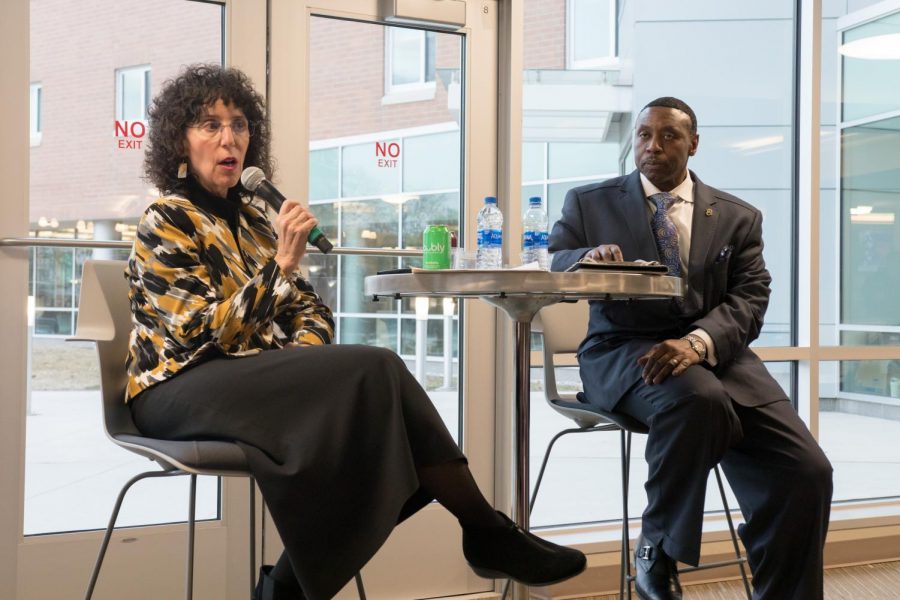Students speak up at Ask Ora
In everyday life, opportunities to speak truth to power come few and far between. At Oakland University, they happen every semester.
On the night of March 18, OU President Ora Hirsch Pescovitz faced the students at Ask Ora. The event took place in the lobby of Oak View Hall and was moderated by Vice President of Student Affairs and Chief Diversity Officer Glenn McIntosh.
Before questioning began, Pescovitz commented on the terrorist attacks in New Zealand. The attacks, carried out on two mosques by a white supremacist, claimed the lives of 50 people.
“I really believe that we here at Oakland University cannot just leave these kinds of incidents alone without acknowledging them, without speaking with a clarion voice, without rising up in protest and saying to ourselves and to others that we reject — with no uncertain terms — hatred of all forms,” Pescovitz said.
Following a moment of silence, students pressed Pescovitz on the struggles at OU.
“I just think it is really interesting when people in positions of power talk about about critical thinking skills and transferable skills as a priority for success in college when [these skills] are often not taught in the education system anymore because they’re not as easily evaluated as just a pass or fail final grade, and there needs to be systematic change overall,” French major Malaena Caldwell said.
Pescovitz responded in turn with her view on student success.
“I recommend that you do the best you can in college and get the best grades that you can,” she said. “If you, for some reason, fall short of graduating with honors, I do not think that it means you will be a failure for the rest of your life.”
Ashley Mosseri brought up the struggles for disabled students on campus.
“I know that when you guys built the new Oakland Center (OC)… you tried to make it as accessible as possible, but it does not really feel like that,” Mosseri said.
Mosseri claimed that the expansion “feels like a maze” to navigate. Mosseri is unable to use stairs, and the elevators contain a “toxic chemical smell” that makes them hard to breathe in and the basement of the OC unreachable.
McIntosh responded to Mosseri, asking her to visit the OC offices to explain the elevator issues further.
Destinee Rule, Oakland University Student Congress (OUSC) diversity and inclusion director, spoke out about several topics. She brought to Pescovitz’s attention the hostile language of Financial Aid Office emails, with warnings like: “Avoid cancellation of your financial aid by completing your requirements posted on MySAIL within 14 days.”
Another point by Rule was the lack of diversity among OU faculty, especially in the president’s mostly white cabinet.
“You want [students of color] to feel successful and you want us to feel represented, and you want us to feel included, but I cannot see myself in these positions,” Rule said. “I cannot see myself getting past my bachelor’s. I can barely go to someone outside the Center for Multicultural Initiatives (CMI) if I want to talk to someone that is of color.”
Pescovitz responded by agreeing with Rule and pointing out difficulties in hiring professors.
“Just think of where we are recruiting from,” Pescovitz said. “All of [the potential professors] have to graduate, they have to get masters, they have to get PhDs, then they have to be recruited by the universities that are looking to recruit from these various fields.”






